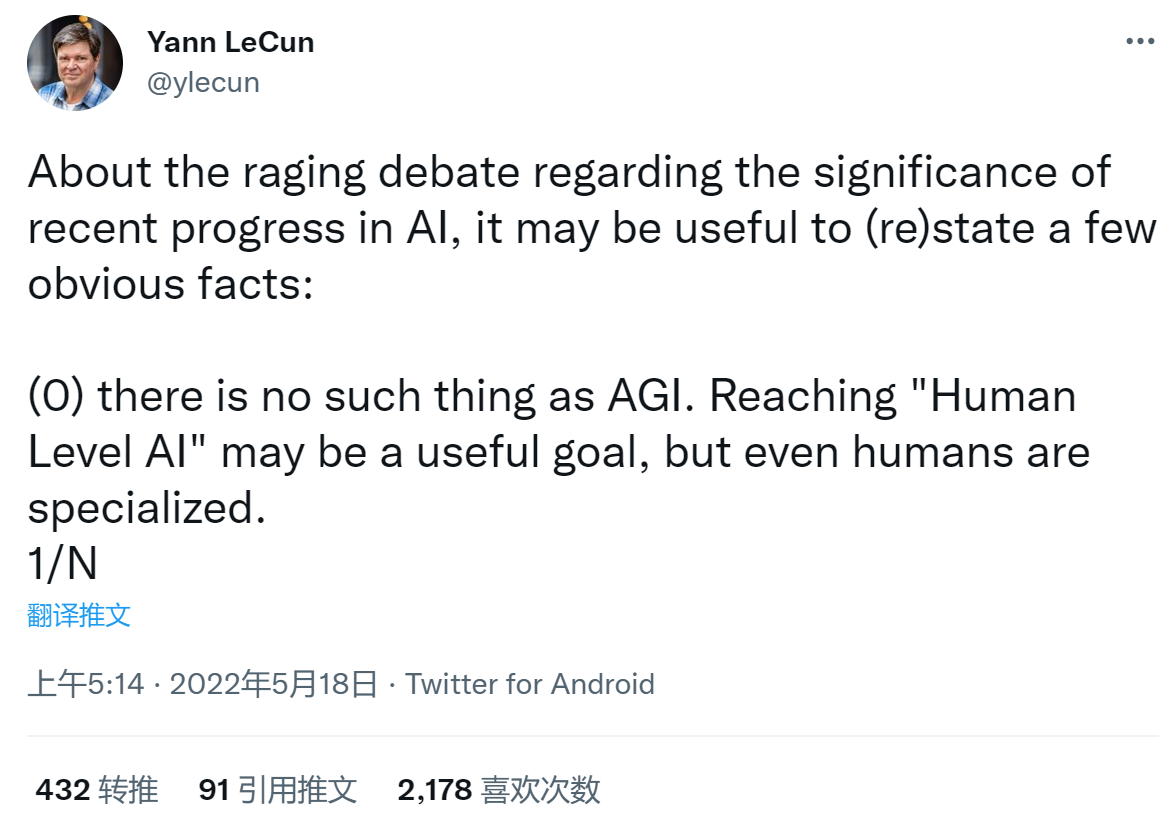图灵奖得主Yann LeCun 5月17日在Facebook上发表了一篇短文,对大模型和人类水平人工智能(Human Level AI)等最新热点发表了自己的看法。虽然不长,但信息量很大。可能觉得Facebook上讨论不够热烈,他第二天又逐条发到了Twitter上。

以下是我们的翻译(在Google Translate基础上做了人肉编辑):
人工智能最近的进展是否重要,最近讨论很激烈,(重新)陈述一些明显的事实可能是有用的:
(0) 没有 AGI 这样的东西。达到“人类水平的人工智能”(HLAI)可能是一个有用的目标,但即使是人类也是专业的。
(1) 学术界正在 HLAI 方面取得*一些*进展
(2) 扩大规模有帮助。这是必要的,但还不够,因为......
(3) 我们仍然缺少一些基本概念
(4) 其中一些新概念可能“指日可待”(例如泛化的自监督学习 generalized self-supervised learning)
(5) 但我们不知道需要多少这样的新概念。我们只看到了这些最明显的。
(6) 因此,我们无法预测到达 HLAI 需要多长时间。
我真的不认为这只是扩大规模的问题。
我们仍然没有一种学习范式,可以让机器学习世界如何运作,就像人类婴儿和许多非人类小动物的那样。
有些人可能认为只要将在标记化输入序列上训练的巨型Transformer不断扩大规模就足够了。
其他人则认为“奖励就足够了”。(指DeepMind David Silver 强化学习通吃的观点)
还有一些人认为显式的符号操作是必要的。
一些人不相信基于梯度的学习是解决方案的一部分。
我相信我们需要找到新的概念,让机器能够:
- 通过像婴儿一样观察来了解世界是如何运作的。
- 学会预测一个人如何通过采取行动来影响世界。
- 学习允许在抽象空间中进行长期预测的分层表示。
- 妥善处理世界并非完全可预测的事实。
- 使智能体能够预测一系列动作的影响,以便能够推理和计划。
- 使机器能够分层计划,将复杂任务分解为子任务。
- 所有这些都应该与基于梯度的学习兼容。
解决方案并非指日可待。
我们有许多障碍要清除,我们还不知道如何清除。
原文:
About the raging debate regarding the significance of recent progress in AI, it may be useful to (re)state a few obvious facts:
(0) there is no such thing as AGI. Reaching "Human Level AI" may be a useful goal, but even humans are specialized.
(1) the research community is making *some* progress towards HLAI
(2) scaling up helps. It's necessary but not sufficient, because....
(3) we are still missing some fundamental concepts
(4) some of those new concepts are possibly "around the corner" (e.g. generalized self-supervised learning)
(5) but we don't know how many such new concepts are needed. We just see the most obvious ones.
(6) hence, we can't predict how long it's going to take to reach HLAI.
I really don't think it's just a matter of scaling things up.
We still don't have a learning paradigm that allows machines to learn how the world works, like human anspd many non-human babies do.
Some may believe scaling up a giant transformer trained on sequences of tokenized inputs is enough.
Others believe "reward is enough".
Yet others believe that explicit symbol manipulation is necessary.
A few don't believe gradient-based learning is part of the solution.
I believe we need to find new concepts that would allow machines to:
- learn how the world works by observing like babies.
- learn to predict how one can influence the world through taking actions.
- learn hierarchical representations that allow long-term predictions in abstract spaces.
- properly deal with the fact that the world is not completely predictable.
- enable agents to predict the effects of sequences of actions so as to be able to reason & plan
- enable machines to plan hierarchically, decomposing a complex task into subtasks.
- all of this in ways that are compatible with gradient-based learning.
The solution is not just around the corner.
We have a number of obstacles to clear, and we don't know how.
内容中包含的图片若涉及版权问题,请及时与我们联系删除



评论
沙发等你来抢